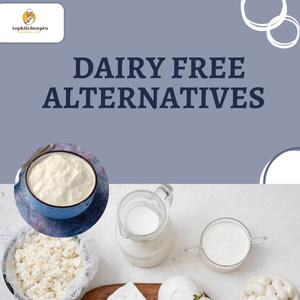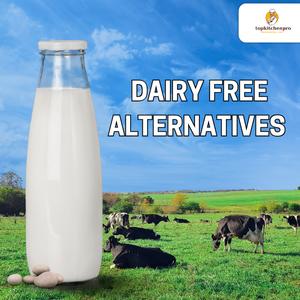Dairy Free Alternatives
Within the last decade or so the search for dairy free alternatives has transitioned from a specialty dietary requirement to a mass culinary phenomenon. Whether spurred by lactose intolerance a milk allergy ethical considerations or mere curiosity about discovering new nutritional terrain more individuals than ever before are traversing beyond the usual cow’s milk. The transformation of this market is such that goodbye to traditional dairy doesn’t have to mean goodbye to flavor creaminess and the pleasure of consumption.
The plant based marketplace has opened up in a big way providing a range of tasty and healthy alternatives to any product one can think of. This trend is transforming the food business and enabling consumers to make choices that reflect their health and values.
Traveling through this new world can be thrilling but daunting. We have created this guide as your friendly companion simplifying the overwhelming plethora of options out there.
We’re going to take you on a journey through the most trendy and creative options simplifying their flavors ideal uses and health benefits. The idea is to inspire you to find that excluding dairy from your diet can be a journey of taste and health and not a time of deprivation. Delight in the prospect of creamy lattes decadent ice creams and silky melted cheese all made from plants.
Venturing into the World of Plant Based Milk
The easiest entry into dairy free living is through plant based milk. This category is no longer soy and rice it is a colorful and multifaceted section of the supermarket shelf. Almond milk is still a longtime favorite with its silky texture and subtle nutty taste making it a great all around pick for cereals and smoothies.
Oat milk has made a dramatic leap in popularity as it has a naturally creamy texture and subtle taste making it an outstanding choice for coffee and perfectly mimicking the mouthfeel of full fat milk. Soy milk is a timeless protein rich choice that performs beautifully in baked goods and as a cooking ingredient.
For those wanting a more decadent richer option coconut milk beverage brings tropical flavor to beverages and curries. Cashew milk is yet another creamy rival usually served as the basis for rich sauces. Every option has its own distinct nutritional profile and taste so you can pick the ideal combination to suit your needs and your personal tastes.

The Revolution of Dairy Free Cheese Alternatives
Goodbye days of rubbery and tasteless vegan cheese. Dairy free cheese revolution is in full gear now with food scientists and makers producing something that really satisfies the cravings. These cheeses are mostly made from nuts such as cashews and almonds which offer a rich and fatty foundation or from coconut oil for the firm sliceable texture.
Nutritional yeast is a hero ingredient in this department offering a savory cheesy taste that is fully plant based. It is now possible to have anything from soft spread style cream cheese substitute’s ideal for bagels through to shreds which convincingly melt on pizzas and casseroles.
Fermented nut cheeses provide an upscale artisanal solution to charcuterie boards with their rich complex flavors and creamy textures. While taste is subjective the quality and variety available today mean there is likely a dairy free cheese out there that will surprise and delight you making the transition away from traditional cheese easier and more delicious than ever before.
Indulging in Delicious Non Dairy Yogurt and Ice Cream
Your favorite creamy desserts and breakfasts are still entirely accessible on a dairy free diet. Nondairy yogurts have come a long way delivering the tangy taste and thick spoon able consistency that yogurt enthusiasts are accustomed to. Coconut milk is the usual foundation resulting in a rich and decadent product while almond and oat milk yogurts are lighter versions. Soy yogurt delivers a protein punch comparable to its dairy equivalent.
So is the case with nondairy ice cream which is a heaven of pampering. Brands employ bases such as cashew oat and coconut cream to produce extremely creamy and rich frozen treats that compare to any high end ice cream. The ingredients’ fat content enables easy scooping and a melting our mouth sensation.
From traditional chocolate and vanilla to creative flavor’s such as salted caramel cluster or mango swirl there are literally hundreds of choices available and everyone is in fact universally satisfying which means you do not have to use dairy to have a frozen treat.

Cooking and Baking with Dairy Alternatives
Converting your favorite recipes to dairy free status is easier than you would imagine and the end product can be just as marvelous. For baking plant milks can almost always be substituted on a one for one basis for cow’s milk. If a recipe requires butter vegan butter sticks or even coconut oil make great substitutes that give the required fat content for flaky pastry and moist cakes.
Buttermilk can be replaced by a teaspoon of lemon juice or vinegar added to your plant milk and left to curdle for several minutes. In savory cooking nutritional yeast is a workhorse for infusing cheesy umami flavor into sauces soups and sprinkles. Cashew cream created by pureeing soaked cashews with water is a miracle worker for producing creamy rich pasta sauces and soups with not a drop of dairy. Stocked with a pantry full of these substitutes you can make almost any dish over again learning new flavors and skills in the process.
Nutritional Aspects of a Well Rounded Dairy Free Diet
Transitioning to a dairy free life demands a cautious attention to nutrition to make sure you are not depriving yourself of essential nutrients commonly linked to milk based foods. The most typical concerns include calcium vitamin D and protein but with good planning your diet can be whole and extremely healthful. The simplest plan is to look for fortified foods. Most plant milks yogurts and even some juices of oranges are fortified with vitamin D and calcium to the same levels as cow’s milk.
A habit of checking nutrition labels is your best resource for finding these enriched foods and invisibly incorporating them into your life to keep your bones strong.
But a really solid diet expands beyond packaged versions to encompass a great range of whole foods. For calcium there are great sources in the plant world.
Dark leafy greens such as kale collard greens. Broccoli almonds tahini sesame seed paste and legumes such as chickpeas also provide generous amounts of bioavailable calcium. For protein important for muscle healing and fullness the possibilities are likewise many. Legumes such as lentils beans and chickpeas are essentials. Tofu and tempeh both soybean products are complete proteins and highly versatile to cook.
Most whole grains and nuts contribute to your daily protein intake as well making sure that your body receives all the necessary amino acids. Vitamin D which is commonly fortified in dairy milk is more difficult to get from food but is accessed through fortified plant milks and cereals primarily. Safe sun exposure is still a natural means for your body to produce its own vitamin D.
In certain climates or during winter a vitamin D supplement could be a wise move to consider with a health care provider. Vitamin B12 is also sometimes discussed a naturally occurring nutrient in animal foods. Because so many plant milks and nutritional yeast are B12fortified this is usually included but it’s another important one to keep an eye out for on your labels.
Really the most important thing for a healthy dairy free diet is to make it varied. By consuming a rainbow of fruits vegetables whole grains legumes nuts and seeds and by opting for fortified substitutes you can establish a nutritionally robust and flavorful pattern of eating that maximally supports your health without any use of dairy.

Conclusion
The transition to dairy free living is now no longer a journey of restriction but one of open culinary adventure. The alternative market has also evolved from mere essentials to one of sophisticated and myriad variety providing tasty and excellent substitutes for each and every dairy item conceivable.
From the perfect barista oat milk in your morning coffee to the rich cashew ice cream dessert the quality and access guarantee that you never once think you are missing out. This change is aided by a growing concern with nutritional requirements and an international aspiration for more sustainable ethically sourced food making this choice not only a personal but also a planetary good.
Plant based foods frequently go hand in hand with less environmental impact providing another level of positive influence to your food choices. Innovation in this sector is impressive with food science continually refining texture flavor and nutrition levels to meet and surpass expectations.
This development ensures that whether you are embracing the complete vegan way of life dealing with an intolerance or merely interested the means to a triumphant and pleasurable transition are easily within reach. The most important thing is to come into this transition with an open mind and a spirit of adventure being willing to try new brands and bases until you discover your own favorites.
In the end trying dairy free is an invitation to be more aware and engaged in the food you eat. It teaches label reading learning about ingredients and the amazing potential of plants to build richness and satisfaction.
This adventure guarantees beyond a shadow of a doubt that you can have extraordinary creaminess treat yourself to rich indulgences and make comforting recognizable dishes with a deliberate choice that just feels good for your body your taste buds and the world at large. The way of the future is inclusive creative and absolutely divine all without any whiff of conventional dairy.
